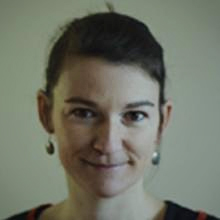Tengo el honor de hacer este vis a vis con una mujer especial: Anna Devenne.
Cuando vi algunas de sus caricaturas me atrajo enseguida su humor. Claro, hay otras coincidencias entre ella y yo. Por ejemplo, estudió Economía Internacional del Desarrollo y yo Ingeniería Civil, dos actividades que no tienen nada que ver con la creación humorística. Pero también ella es francesa radicada en Madrid, España y yo cubano, nacionalizado chileno; es decir, tenemos una experiencia vivencial parecida por esa parte. En fin, que por su calidad humorística y por su historia personal, me cayó super bien y de inmediato me propuse conversar frente a frente con ella y ahora tengo ese gran placer…
PP: Anne, ¿puedes presentarte profesionalmente para los lectores de Humor Sapiens que quizás no te conozcan?
ANNE: Soy una caricaturista francesa afincada en Madrid en España. Firmo mis viñetas como ADENE. Llevo publicando mis viñetas desde el 2011. Colaboro con revistas y periódicos franceses y europeos y también con ONGs e instituciones internacionales.
PP: Gracias. Pero sin dudas, venció en ti la humildad. Así que me veo en la obligación de dar algunos datos tuyos más: ha ganado muchos premios internacionales como primer premio en el concurso internacional de humor gráfico Niels Bugge en 2016; segundo premio en el concurso de humor gráfico «Exile» organizado por EXILE-Kulturkoordination en 2017; tercer premio “El alto precio de una prensa libre”, Concurso de humor gráfico, Canadá en 2017; Primer Premio en el European Cartoon Award, en 2020, etc., y también debo añadir que como ilustradora, ha publicado varios libros infantiles con las editoriales francesas A2MIMO y Frimousse. En fin, una fructífera carrera, a pesar de ser tan joven.
Y para conocerla mejor, empiezo con mis preguntas más directas: ¿qué es el humor para ti?
ANNE: El humor es una herramienta para denunciar. También sirve para tomar distancia con las cosas en este mundo tan complicado, y vivir de forma más ligera.
PP: Para vivir de forma tan ligera, como dices, ¿crees que el humor no deba tener límites?
ANNE: El humor tiene límites que es el mismo que se suele dictar por ley en muchas democracias. El humor nunca se debería usar para discriminar o atacar a las minorías, a alguien por ser diferente físicamente etc.
Pero aparte de eso, creo que cuando se usa de forma inteligente, el humor gráfico puede tratar cualquier tema, hasta los más graves.
PP: Estamos muy de acuerdo. Ahora acerquémonos más a tu trabajo. ¿Ha evolucionado tu obra, tanto en forma como en contenidos, desde que te iniciaste en esta profesión hasta el día de hoy?
ANNE: Mis primeras viñetas las hacía en blanco y negro, con tinta en papel. Eran muy diferentes de las de hoy en día. Pero decidí bastante rápidamente cambiar de técnica para hacerlas en color y desde entonces mi estilo sigue siendo el mismo, sólo que mejorando poco a poco (bueno, eso espero, je, je).
Y mis temas de predilección siguen siendo los mismos: el medio ambiente, los derechos humanos... aunque puedo tratar otros temas muy variados, según la actualidad o los encargos que me llegan y pueden ser de todo tipo.
PP: ¿A cuáles colegas -fallecidos y/o vivos- admiras más?
ANNE: Me encanta Quino. Me gustaba leer Mafalda de pequeña a pesar de que no lo entendía. Cuando lo volví a leer de mayor y me di cuenta del humor, del mensaje tan fuerte que tenía, fue un gran descubrimiento para mí. Me di cuenta del poder del humor gráfico y me dio ganas de dibujar para transmitir mensajes.
Aparte de él admiro a tanta gente más que la lista sería demasiada larga.
PP: Coincidimos en eso también. Yo soy fanático a la obra de Quino. Pero, Anna, ya mencioné al inicio que has obtenido unos cuantos premios internacionales con tus obras (aprovecho para felicitarte, ya que no lo hice en ese momento). Entonces, pienso que si te preguntara: “¿qué significan esos premios para ti?”, me dirías algo así como: “son un estímulo para continuar”, ¿no es cierto? Es lógico. Por supuesto, si deseas responderme otra cosa, lo acepto feliz. Pero por si acaso, prefiero preguntarte, ¿qué significan los concursos internacionales para los humoristas gráficos? ¿Es necesario participar en ellos? ¿Premios, menciones y hasta solo aparecer en los catálogos, dan conveniente prestigio entre los pares, entre los críticos y especialistas, entre los encargados de publicar en los medios de comunicación, etc.? ¿Significa que si uno no participa en los Concursos no existe?
ANNE: Para mí, los concursos internacionales tienen un significado muy especial, porque es a través de ellos que me anime a dibujar cada vez más. Yo dibujaba para mí misma y empecé a buscar concursos. porque me estimulaban. Buscaba ideas sobre el tema del concurso, las dibujaba y enviaba mis obras, pero sin mucha esperanza de ganar. Así que cuando gané mi primer premio en un concurso internacional en el 2011, me di cuenta de que mis viñetas podían gustar y eso me animó a seguir adelante.
Así que, al principio de mi carrera, fueron un estímulo para continuar. Pero no creo que los concursos den mucha visibilidad o puedan ayudar a tener encargos. Son un estímulo personal y un reconocimiento de la profesión.
PP: Bueno, no estoy muy seguro, me imagino que a un colega que le cueste publicar en los medios, el que gane un concurso le pueda abrir paso en un medio, porque éste considere que crece su prestigio si sus dibujantes son premiados. Aunque quizás no, ya sabemos cómo están las cosas en este mundo. Pero quiero seguir con tu obra. ¿Has incursionado en caricaturas de humor blanco o sólo haces sátira y humor para hacer pensar?
ANNE: Lo mío es más bien el humor para hacer pensar. Yo empecé a dibujar porque necesitaba reaccionar a injusticias y expresarlo. Entonces, hasta ahora no he llegado a hacer muchas caricaturas de humor blanco.
PP: ¿Y cómo ves la salud del humor gráfico en el mundo en la actualidad?
ANNE: El humor gráfico tiene más visibilidad que antes a través de las redes sociales ya que en ellas todo es tan visual. Eso ha dado voz a gente que no podrían publicar en periódicos o revistas. Lo malo es que los medios tradicionales publican cada vez menos (y pagan cada vez menos) viñetas, por lo que es complicado para los caricaturistas vivir de ello.
El lado negativo también es que con las redes sociales hay más riesgo de acoso y ataque en masa cuando uno publica una viñeta que no está gustando a una parte de la gente o que no han entendido bien el mensaje. Falta educar a la gente (desde muy pequeños, en los colegios) para que aprendan a leer correctamente el mensaje en las viñetas. En las redes podemos ver que mucha gente no es capaz de interpretar de forma correcta las viñetas que publican los caricaturistas.
PP: Quizás sigan cerrando publicaciones y los caricaturistas tengan solo Internet para sobrevivir en un futuro cercano. Sin embargo, no se ha resuelto el tema de las remuneraciones ahí. Si fueras pitonisa, ¿cuáles serían tus predicciones para el devenir de tu profesión?
ANNE: Hay revistas digitales que pagan por publicar viñetas, pero son pocas y es cada vez más difícil conseguir un precio digno por su publicación. El sector se ha vuelto complicado para todo el mundo, también para los periodistas, fotógrafos etc.
Menos para unos pocos, hoy en día es imposible vivir al 100% como caricaturista, y será aún más difícil en el futuro. Muchos hoy en día tienen otro trabajo muy diferente paralelo y eso a pesar de tener a muchos seguidores en las redes sociales.
Así que creo que en el futuro será cada vez más complicado vivir de ello, pero al mismo tiempo, como lo decía antes, Internet ha dado voz a mucha gente que antes no podían expresarse porque sólo se publicaban las viñetas de una pequeña minoría de caricaturistas. El humor gráfico seguirá siendo muy presente y muy importante en el futuro, eso no lo dudo.
PP: Me gusta saber que hay gente como tú que piensa así. Bueno, para comenzar a cerrar nuestro vis a vis: dentro del humor, ¿qué te falta hacer que no hayas hecho? (Y que te gustaría hacer, claro).
ANNE: Me gustaría indagar el tema del humor autobiográfico. Usar el humor para hablar de temas del día a día con viñetas más personales.
PP: Siempre finalizo esta conversación queriendo saber lo siguiente: ¿se te ocurre alguna pregunta que te hubiera gustado que te hiciera? Y si es así, ¿podrías responderla?
ANNE: La entrevista fue muy completa así que no tengo más preguntas en mente que pudiesen faltar.
Te agradezco mucho por todas esas preguntas tan interesantes.
PP: ¡No, querida! No me tienes que agradecer nada. El placer, el honor, fue totalmente mío, así que el agradecido soy yo y estoy seguro que los lectores de Humor Sapiens estará muy contentos de conocerte un poco más.
¡Te deseo el mayor de los éxitos!
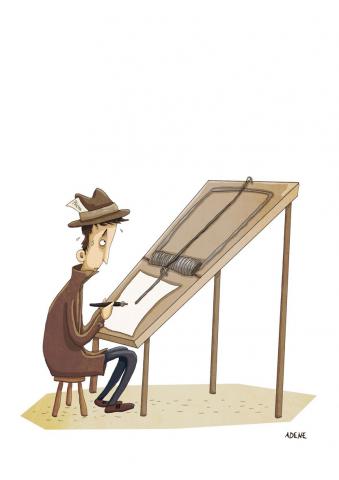
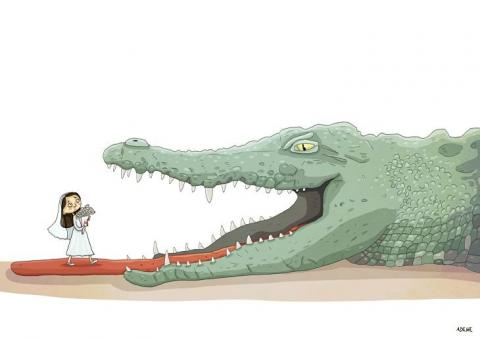
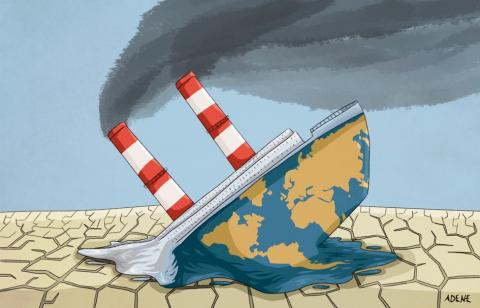
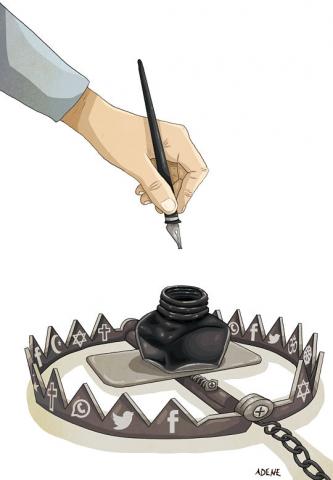
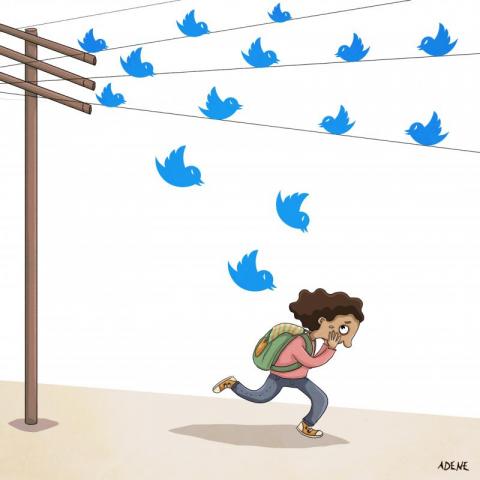
Interview with Anne Derenne
By Pepe Pelayo
Humor is a tool to denounce
I have the honor of interviewing a special woman on this occasion: Anna Devenne.
When I saw some of his cartoons I was immediately attracted to his humor. Of course, there are other coincidences between her and me. For example, he studied International Development Economics and I studied Civil Engineering, two activities that have nothing to do with humorous creation. But she is also French living in Madrid, Spain and I am Cuban, nationalized Chilean; That is, we have a similar experiential experience on that part. Anyway, because of her humorous quality and her personal story, I really liked her and I immediately decided to maintain a “dialogue” with her and now I have that great pleasure…
PP: Anne, can you introduce yourself professionally for Humor Sapiens readers who may not know you?
ANNE: I am a French cartoonist based in Madrid in Spain. I sign my cartoons as ADENE. I have been publishing my cartoons since 2011. I collaborate with French and European magazines and newspapers and also with NGOs and international institutions.
PP: Thank you. But without a doubt, humility won out in you. So I feel obliged to give some more information about you: you have won many international awards such as first prize in the Niels Bugge international graphic humor competition in 2016; second prize in the “Exile” graphic humor contest organized by EXILE-Kulturkoordination in 2017; third prize “The high price of a free press”, Graphic humor contest, Canada in 2017; First Prize in the European Cartoon Award, in 2020, etc., and I must also add that as an illustrator, she has published several children's books with the French publishers A2MIMO and Frimousse. In short, a fruitful career, despite being so young.
And to get to know it better, I start with my most direct questions: what is humor for you?
ANNE: Humor is a tool to denounce. It also serves to distance yourself from things in this complicated world, and live more lightly.
PP: To live so lightly, as you say, do you think humor should have no limits?
ANNE: Humor has limits, which are the same ones that are usually dictated by law in many democracies. Humor should never be used to discriminate or attack minorities, someone for being physically different, etc.
But other than that, I believe that when used intelligently, graphic humor can address any topic, even the most serious ones.
PP: We very much agree. Now let's get closer to your work. Has your work evolved, both in form and content, since you started in this profession until today?
ANNE: My first cartoons were done in black and white, with ink on paper. They were very different from those of today. But I decided quite quickly to change my technique to do them in color and since then my style has remained the same, just improving little by little (well, I hope so, heh heh).
And my favorite topics remain the same: the environment, human rights... although I can deal with other very varied topics, depending on current events or the assignments that come to me and they can be of all kinds.
PP: Which colleagues - deceased and/or living - do you admire the most?
ANNE: I love Quino. I liked reading Mafalda when I was little even though I didn't understand it. When I read it again as an adult and realized the humor, the strong message it had, it was a great discovery for me. I realized the power of graphic humor and it made me want to draw to convey messages.
Apart from him I admire so many other people that the list would be too long.
PP: We agree on that too. I am a fan of Quino's work. But, Anna, I already mentioned at the beginning that you have won a few international awards for your works (I take this opportunity to congratulate you, since I didn't do so at the time). So, I think that if I asked you: “what do those awards mean to you?”, you would say something like: “they are an incentive to continue”, right? It is logical. Of course, if you want to answer me something else, I'm happy to accept it. But just in case, I prefer to ask you, what do international competitions mean for cartoonists? Is it necessary to participate in them? Do awards, mentions and even just appearing in catalogs give appropriate prestige among peers, among critics and specialists, among those in charge of publishing in the media, etc.? Does it mean that if one does not participate in the Contests it does not exist?
ANNE: For me, international competitions have a very special meaning, because it is through them that I am encouraged to draw more and more. I drew for myself and started looking for contests. because they stimulated me. I was looking for ideas on the theme of the contest, I drew them and sent my works, but without much hope of winning. So when I won my first prize in an international competition in 2011, I realized that my cartoons could be liked and that encouraged me to keep going.
So, at the beginning of my career, they were an encouragement to continue. But I don't think that contests give much visibility or can help get commissions. They are a personal stimulus and recognition of the profession.
PP: Well, I'm not very sure, I imagine that for a colleague who finds it difficult to publish in the media, the one who wins a contest can make way for him in a medium, because he considers that his prestige increases if his cartoonists are awarded. Although maybe not, we already know how things are in this world. But I want to continue with your work. Have you ventured into white humor cartoons or do you only do satire and humor to make people think?
ANNE: Mine is more humor to make you think. I started drawing because I needed to react to injustices and express it. So, until now I haven't gotten around to making many white humor cartoons.
PP: And how do you see the health of graphic humor in the world today?
ANNE: Graphic humor has more visibility than before through social networks since everything is so visual. This has given a voice to people who could not publish in newspapers or magazines. The bad thing is that traditional media publish fewer and fewer (and pay less and less) cartoons, making it difficult for cartoonists to make a living from it.
The negative side is also that with social networks there is a greater risk of harassment and mass attack when one publishes a cartoon that some people do not like or that they have not understood the message well. There is a need to educate people (from a very young age, in schools) so that they learn to correctly read the message in the cartoons. On the networks we can see that many people are not able to correctly interpret the cartoons published by cartoonists.
PP: Maybe publications will continue to close and cartoonists will only have the Internet to survive in the near future. However, the issue of remuneration has not been resolved there. If you were a fortune teller, what would be your predictions for the future of your profession?
ANNE: There are digital magazines that pay to publish cartoons, but they are few and it is increasingly difficult to get a decent price for their publication. The sector has become complicated for everyone, including journalists, photographers, etc.
Except for a few, today it is impossible to live 100% as a cartoonist, and it will be even more difficult in the future. Many today have a very different parallel job and that despite having many followers on social networks.
So I think that in the future it will be increasingly difficult to make a living from it, but at the same time, as I said before, the Internet has given a voice to many people who previously could not express themselves because only the cartoons of a small minority of cartoonists were published. . Graphic humor will continue to be very present and very important in the future, I have no doubt about that.
PP: I like to know that there are people like you who think like that. Well, to begin to close our “dialogue”: within humor, what do you need to do that you haven't done? (And what you would like to do, of course).
ANNE: I would like to investigate the topic of autobiographical humor. Use humor to talk about everyday topics with more personal vignettes.
PP: I always end these “dialogues” wanting to know the following: can you think of any questions that you would have liked me to ask you? And if so, could you answer it?
ANNE: The interview was very complete so I don't have any more questions in mind that might be missing.
I thank you very much for all those interesting questions.
PP: No, dear! You don't have to thank me for anything. The pleasure, the honor, was totally mine, so I am the one who is grateful and I am sure that the readers of Humor Sapiens will be very happy to know you a little more.
I wish you the greatest success!
(This text has been translated into English by Google Translate)

